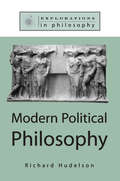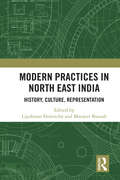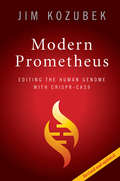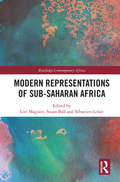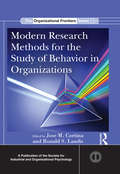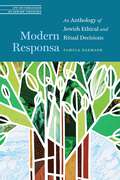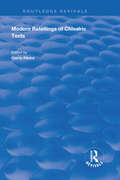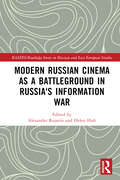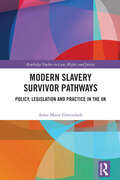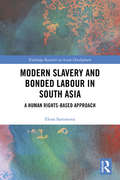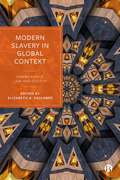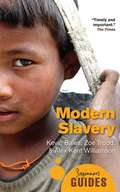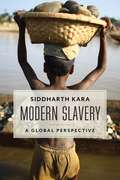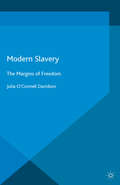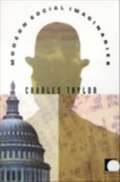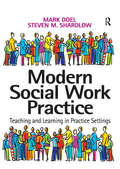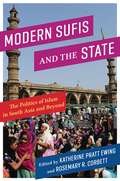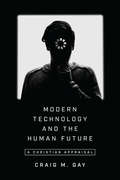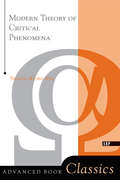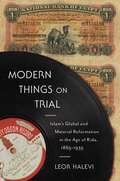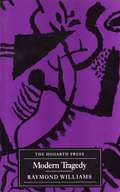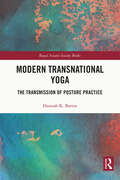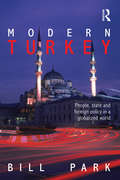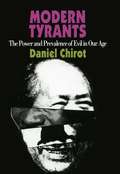- Table View
- List View
Modern Political Philosophy
by Richard HudelsonAn introduction to the topics and issues in political philosophy, from the Enlightenment to Postmodernism. The author presents both the historical background of, and a systematic discussion of contemporary issues relating to the major traditions within political philosophy.
Modern Practices in North East India: History, Culture, Representation
by Lipokmar Dzüvichü Manjeet BaruahThis book brings together essays on North East India from across disciplines to explore new understandings of the colonial and contemporary realities of the region. Departing from the usual focus on identity and politics, it offers fresh representations from history, social anthropology, culture, literature, politics, performance and gender. Through the lens of modern practices, the essays in this volume engage with diverse issues, including state-making practices, knowledge production and its politics, history writing, colonialism, role of capital, institutions, changing locations of orality and modernity, production and reception of texts, performances and literatures, social change and memory, violence and gender relations, along with their wider historical, geographical and ideational mappings. In the process, they illustrate how the specificities of the region can become useful sites to interrogate global phenomena and processes — for instance, in what ways ideas and practices of modernity played an important role in framing the region and its people. Further, the volume underlines the complex ways in which the past came to be imagined, produced and contested in the region. With its blend of inter-disciplinary approach, analytical models and perspectives, this book will be useful to scholars, researchers and general readers interested in North East India and those working on history, frontiers and borderlands, gender, cultural studies and literature.
Modern Prometheus
by Jim KozubekWould you change your genes if you could? As we confront the 'industrial revolution of the genome', the recent discoveries of Crispr-Cas9 technologies are offering, for the first time, cheap and effective methods for editing the human genome. This opens up startling new opportunities as well as significant ethical uncertainty. Tracing events across a fifty-year period, from the first gene splicing techniques to the present day, this is the story of gene editing - the science, the impact and the potential. Kozubek weaves together the fascinating stories of many of the scientists involved in the development of gene editing technology. Along the way, he demystifies how the technology really works and provides vivid and thought-provoking reflections on the continuing ethical debate. Ultimately, Kozubek places the debate in its historical and scientific context to consider both what drives scientific discovery and the implications of the 'commodification' of life.
Modern Prometheus (Rev. Edition): Editing the Human Genome with Crispr-Cas9
by Jim KozubekWould you change your genes if you could? As we confront the 'industrial revolution of the genome', the recent discoveries of Crispr-Cas9 technologies are offering, for the first time, cheap and effective methods for editing the human genome. This opens up startling new opportunities as well as significant ethical uncertainty.<P><P> Tracing events across a fifty-year period, from the first gene splicing techniques to the present day, this is the story of gene editing - the science, the impact and the potential, Kozubek weaves together the fascinating stories of many of the scientists involved in the development of gene editing technology. <P>Along the way, he demystifies how the technology really works and provides vivid and thought-provoking reflections on the continuing ethical debate. Ultimately, Kozubek places the debate in its historical and scientific context to consider both what drives scientific discovery and the implications of the 'commodification' of life.<P> Demystifies Crispr, the revolutionary genome editing tool, named Science magazine's Breakthrough Technology of 2015.<P> Tells the dramatic, interwoven stories of the scientists and their discoveries that led to the emergence of this transformative technology.<P> Provides thought-provoking insights into the impact and ethical dilemmas of the Crispr world that we all now live in.
Modern Representations of Sub-Saharan Africa (Routledge Contemporary Africa)
by Lori Maguire Susan Ball Sébastien LefaitThis book examines how representations of African in the Anglophone West have changed in the post-imperial age. The period since the Second World War has seen profound changes in sub-Saharan Africa, notably because of decolonization, the creation of independent nation-states and the transformation of the relationships with the West. Using a range of case studies from news media, maps, popular culture, film and TV the contributions assess how narrative and counter-narratives have developed and been received by their audiences in light of these changes. Examining the overlapping areas between media representations and historical events, this book will be of interest to students and scholars of African Studies and Media and Cultural Studies.
Modern Research Methods for the Study of Behavior in Organizations (SIOP Organizational Frontiers Series)
by Jose M. Cortina Ronald S. LandisThe goal of the chapters in this SIOP Organizational Frontiers Series volume is to challenge researchers to break away from the rote application of traditional methodologies and to capitalize upon the wealth of data collection and analytic strategies available to them. In that spirit, many of the chapters in this book deal with methodologies that encourage organizational scientists to re-conceptualize phenomena of interest (e.g., experience sampling, catastrophe modeling), employ novel data collection strategies (e.g., data mining, Petri nets), and/or apply sophisticated analytic techniques (e.g., latent class analysis). The editors believe that these chapters provide compelling solutions for the complex problems faced by organizational researchers.
Modern Responsa: An Anthology of Jewish Ethical and Ritual Decisions (JPS Anthologies of Jewish Thought)
by Rabbi Pamela BarmashAn original anthology of modern responsa (Jewish ethical and ritual decision-making) by rabbinic authorities, men and women, across movements (Conservative, Orthodox, Reform), geographic locales, and ethnicities (Ashkenazic, Sefardic, Mizraḥi), Modern Responsa engages readers in understanding how rabbis expert in Jewish law apply principles, precedents, and rules from Judaism&’s legal tradition to real-life issues. Responsa on ten topics—personal and business ethics, ritual, personal status, women, LGBTQIA+ people, medical ethics, the COVID-19 pandemic, relationships with the other, the modern State of Israel, and Jewish life in the United States—showcase how the rabbinic decisors who wrote them handle modern quandaries for their communities. Pamela Barmash&’s translations open up most of these original Hebrew texts to English-speaking readers for the first time. Sometimes the decisors disagree—but other times they rule similarly, despite differing ideological commitments. Clear explanations of how the decisors build their arguments along with historical background, decisor biographies, implications, and a glossary enable general adult and teen readers as well as scholars to grasp the finer points of Jewish ethical and ritual decision-making. Ultimately, Modern Responsa illuminates the dynamic nature of Jewish law, the creativity of Jewish legal writings, and the multidimensionality of the Jewish experience in modernity.
Modern Retellings of Chivalric Texts (Routledge Revivals)
by Gloria AllairePublished in 1999, the ten essays in this collection identify and examine reworkings of identifiable source texts from the medieval or Renaissance periods. The reasons for the modern adaptations depend variously on an individual author’s personal perspectives, the worldview of his or her society, and the individual’s place in it. The various chapters therefore address issues such as why a particular model was chosen and how its retelling depends on the modern author/auteur’s misreading or rereading of medieval chivalric conventions. This book compliments numerous existing studies of medievalism in the Enlightenment and Victorian eras by examining more recent adaptations of the much studied Arthurian romances, but primarily extends the discussion on the nature of revivals to other medieval or Renaissance chivalric texts, especially the Carolingian cycle epic. The collection includes not only literary retellings of medieval texts, but also some in different media, such as theatre and cinema.
Modern Russian Cinema as a Battleground in Russia's Information War (ISSN)
by Alexander RojavinThis book explores how modern Russian cinema is part of the international information war that has unfolded across a variety of battlefields, including social media, online news, and television. It outlines how Russian cinema has been instrumentalized, both by the Kremlin's allies and its detractors, to convey salient political and cultural messages, often in subtle ways, thereby becoming a tool for both critiquing and serving domestic and foreign policy objectives, shaping national identity, and determining cultural memory. It explains how regulations, legislation, and funding mechanisms have rendered contemporary cinema both an essential weapon for the Kremlin and a means for more independent figures to publicly frame official government policy. In addition, the book employs formal cinematic analysis to highlight the dominant themes and narratives in modern Russian films of a variety of genres, situating them in Russia’s broader rhetorical ecosystem and explaining how they serve the objectives of the Kremlin or its opponents.
Modern Slavery Survivor Pathways: Policy, Legislation and Practice in the UK (Routledge Studies in Law, Rights and Justice)
by Anne-Marie GreensladeThis book presents a critical chronology of the modern slavery survivor journey in the UK, from intervention by the authorities to long-term recovery. The work examines the modern slavery survivor pathway and assesses the support systems available to survivors throughout this process. It also explores links to other traumatic crimes and investigates how the role of ‘witness’ in the criminal justice system impacts survivors’ experiences. The work showcases findings from interviews with frontline practitioners alongside analysis of government publications and independent reports. It emphasises the importance of holistic care pathways with a consistent, benchmark standard of support across all services, including advocacy for each individual. It further argues that the UK government needs to extend its anti-slavery efforts towards long-term support and understanding of survivor needs, which should include a focus on survivor narratives and input. It is argued that this would not only improve recovery outcomes but would advance the criminal justice process in this area through witness retention and stronger evidence. The book will be of interest to academics, researchers and policy-makers in the areas of human rights, criminal justice, social justice and victimology. Based on international legal instruments, the work will appeal to an international readership.
Modern Slavery and Bonded Labour in South Asia: A Human Rights-Based Approach (Routledge Research on Asian Development)
by Elena SamonovaThis book investigates one of the most pervasive forms of modern slavery: bonded labour, whereby labour is linked with a credit agreement, leaving a debtor bound to repay their debt through long-term servitude. Drawing on cases from Nepal and India, the author adopts a human rights-based approach, interpreting slavery as a violation of human rights, and focusing on the empowerment of slaves as rights holders. Ultimately the book aims to explore the links between rights, power inequality and oppression, and to uncover ways to achieve the full liberation of bonded labourers. Identifying the factors and forces that contribute to and reinforce the situation of bonded labour in South Asia, the book demonstrates how systems of bonded labour are connected to long-term processes of colonisation, dispossession, migration, nationalisation of natural resources, and the introduction of private land ownership. Despite the fact that the United Nations has reported debt bondage as the most prevalent form of forced labour worldwide, there it is still little known about the real practical impacts of this approach to the lives of marginalised people. Based on extensive ethnographic research, this book will be a useful guide to students and scholars of modern slavery, international development, and South Asian studies.
Modern Slavery in Global Context: Human Rights, Law, and Society
by Elizabeth A. FaulknerThis thought-provoking collection brings together academics from a range of disciplines to examine modern slavery. It illustrates how different disciplinary positions, methodologies and perspectives form and clash together through a kaleidoscopic view to contribute a unique insight into critical modern slavery studies. Providing a platform to critique the legal, ideological and political responses to the issue, experts interrogate the construct of modern slavery and the anti-trafficking discourse which have dominated contemporary responses to and understandings of exploitation. Drawing on a range of global real-world examples, this is a vital contribution to the study of modern slavery.
Modern Slavery: A Beginner's Guide (Beginner's Guides)
by Kevin Bales Zoe Trodd Alex Kent WilliamsonThere are 27 million slaves alive today - more than at any point in history. Written by the world's leading experts, this shocking examination combines original research with first-hand stories from the slaves themselves to provide a reliable account of one of the worst humanitarian crises facing us today. Looking to the future, the authors offer hope with a global blueprint that proposes to end slavery in our lifetime. Kevin Bales is president of Free the Slaves. He lives in Takoma Park, MD. Zoe Trodd and Alex Kent Williamson are history and pathology specialists respectively at Harvard University.
Modern Slavery: A Global Perspective
by Siddharth KaraSiddharth Kara is a tireless chronicler of the human cost of slavery around the world. He has documented the dark realities of modern slavery in order to reveal the degrading and dehumanizing systems that strip people of their dignity for the sake of profit—and to link the suffering of the enslaved to the day-to-day lives of consumers in the West. In Modern Slavery, Kara draws on his many years of expertise to demonstrate the astonishing scope of slavery and offer a concrete path toward its abolition.From labor trafficking in the U.S. agricultural sector to sex trafficking in Nigeria to debt bondage in the Southeast Asian construction sector to forced labor in the Thai seafood industry, Kara depicts the myriad faces and forms of slavery, providing a comprehensive grounding in the realities of modern-day servitude. Drawing on sixteen years of field research in more than fifty countries around the globe—including revelatory interviews with both the enslaved and their oppressors—Kara sets out the key manifestations of modern slavery and how it is embedded in global supply chains. Slavery offers immense profits at minimal risk through the exploitation of vulnerable subclasses whose brutalization is tacitly accepted by the current global economic order. Kara has developed a business and economic analysis of slavery based on metrics and data that attest to the enormous scale and functioning of these systems of exploitation. Beyond this data-driven approach, Modern Slavery unflinchingly portrays the torments endured by the powerless. This searing exposé documents one of humanity’s greatest wrongs and lays out the framework for a comprehensive plan to eradicate it.
Modern Slavery: The Margins of Freedom
by Julia O'Connell DavidsonProviding a unique critical perspective to debates on slavery, this book brings the literature on transatlantic slavery into dialogue with research on informal sector labour, child labour, migration, debt, prisoners, and sex work in the contemporary world in order to challenge popular and policy discourse on modern slavery.
Modern Social Imaginaries
by Charles TaylorOne of the most influential philosophers in the English-speaking world, Charles Taylor is internationally renowned for his contributions to political and moral theory, particularly to debates about identity formation, multiculturalism, secularism, and modernity. In Modern Social Imaginaries, Taylor continues his recent reflections on the theme of multiple modernities. To account for the differences among modernities, Taylor sets out his idea of the social imaginary, a broad understanding of the way a given people imagine their collective social life. Retelling the history of Western modernity, Taylor traces the development of a distinct social imaginary. Animated by the idea of a moral order based on the mutual benefit of equal participants, the Western social imaginary is characterized by three key cultural forms--the economy, the public sphere, and self-governance. Taylor's account of these cultural formations provides a fresh perspective on how to read the specifics of Western modernity: how we came to imagine society primarily as an economy for exchanging goods and services to promote mutual prosperity, how we began to imagine the public sphere as a metaphorical place for deliberation and discussion among strangers on issues of mutual concern, and how we invented the idea of a self-governing people capable of secular "founding" acts without recourse to transcendent principles. Accessible in length and style, Modern Social Imaginaries offers a clear and concise framework for understanding the structure of modern life in the West and the different forms modernity has taken around the world.
Modern Social Work Practice: Teaching and Learning in Practice Settings
by Mark Doel Steven M. ShardlowModern Social Work Practice is an interactive book designed to provide readers with an opportunity to engage with key aspects of current social work practice. It also provides an excellent digest of the significant literature. Each chapter is introduced with an activity or exercise designed to aid student learning in discrete aspects of practice, building up to a complete curriculum for practice learning. The book builds upon the success and style of Social Work Practice (1993) and The New Social Work Practice (1998). Mark Doel and Steven M. Shardlow have shaped the book to take account of the National Occupational Standards for Social Work, aiming to provide a creative, practical and up-to-date resource for teaching and learning in line with current practices.
Modern Sufis and the State: The Politics of Islam in South Asia and Beyond (Religion, Culture, and Public Life)
by Katherine Pratt Ewing and Rosemary R. CorbettSufism is typically thought of as the mystical side of Islam. In recent years, it has been held up as a supposedly peaceful alternative to the spread of forms of Islam associated with violence, an embodiment of democratic ideals of tolerance and pluralism. Are Sufis in fact as otherworldy and apolitical as this stereotype suggests?Modern Sufis and the State brings together a range of scholars, including anthropologists, historians, and religious-studies specialists, to challenge common assumptions that are made about Sufism today. Focusing on India and Pakistan within a broader global context, this book provides locally grounded accounts of how Sufis in South Asia have engaged in politics from the colonial period to the present. Contributors foreground the effects and unintended consequences of efforts to link Sufism with the spread of democracy and consider what roles scholars and governments have played in the making of twenty-first-century Sufism. They critique the belief that Salafism and Sufism are antithetical, offering nuanced analyses of the diversity, multivalence, and local embeddedness of Sufi political engagements and self-representations in Pakistan and India. Essays question the portrayal of Sufi shrines as sites of toleration, peace, and harmony, exploring cases of tension and conflict. A wide-ranging interdisciplinary collection, Modern Sufis and the State is a timely call to think critically about the role of public discourse in shaping perceptions of Sufism.
Modern Technology and the Human Future: A Christian Appraisal
by Craig M. GayTechnology is not neutral.
Modern Theory Of Critical Phenomena
by Shang-keng MaAn important contributor to our current understanding of critical phenomena, Ma introduces the beginner--especially the graduate student with no previous knowledge of the subject-to fundamental theoretical concepts such as mean field theory, the scaling hypothesis, and the renormalization group. He then goes on to apply the renormalization group to selected problems, with emphasis on the underlying physics and the basic assumptions involved.
Modern Things on Trial: Islam’s Global and Material Reformation in the Age of Rida, 1865–1935
by Leor HaleviIn cities awakening to global exchange under European imperial rule, Muslims encountered all sorts of strange and wonderful new things—synthetic toothbrushes, toilet paper, telegraphs, railways, gramophones, brimmed hats, tailored pants, and lottery tickets. The passage of these goods across cultural frontiers spurred passionate debates. Realizing that these goods were changing religious practices and values, proponents and critics wondered what to outlaw and what to permit.In this book, Leor Halevi tells the story of the Islamic trials of technological and commercial innovations of the late nineteenth and early twentieth centuries. He focuses on the communications of an entrepreneurial Syrian interpreter of the shariʿa named Rashid Rida, who became a renowned reformer by responding to the demand for authoritative and authentic religious advice. Upon migrating to Egypt, Rida founded an Islamic magazine, The Lighthouse, which cultivated an educated, prosperous readership within and beyond the British Empire. To an audience eager to know if their scriptures sanctioned particular interactions with particular objects, he preached the message that by rediscovering Islam’s foundational spirit, the global community of Muslims would thrive and realize modernity’s religious and secular promises.Through analysis of Rida’s international correspondence, Halevi argues that religious entanglements with new commodities and technologies were the driving forces behind local and global projects to reform the Islamic legal tradition. Shedding light on culture, commerce, and consumption in Cairo and other colonial cities, Modern Things on Trial is a groundbreaking account of Islam’s material transformation in a globalizing era.
Modern Tragedy
by Raymond WilliamsIn Modern Tragedy, Williams bridges the gap between literary and socio-economic study, tracing the notion of tragedy from its philosophical and dramatic origins with Aristotle. In addition, Williams discusses tragedy in Chaucher, Nietzche, Brecht, Sartre and other leading figures in the history of thought, as well as elements of tragic experience – both political and personal - in socialist revolutions of the 20th century.
Modern Transnational Yoga: The Transmission of Posture Practice (Royal Asiatic Society Books)
by Hannah K. BartosThis is the first book to address the social organisation of modern yoga practice as a primary focus of investigation and to undertake a comparative analysis to explore why certain styles of yoga have successfully transcended geographical boundaries and endured over time, whilst others have dwindled and failed. Using fresh empirical data of the different ways in which posture practice was disseminated transnationally by Krishnamacharya, Sivananda and their leading disciples, the book provides an original perspective. The author draws upon extensive archival research and numerous fieldwork interviews in India and the UK to consider how the field of yoga we experience today was shaped by historic decisions about how it was transmitted. The book examines the specific ways in which a small group of yogis organised their practices and practitioners to popularise their styles of yoga to mainstream audiences outside of India. It suggests that one of the most overlooked contributions has been that of Sivananda Saraswati (1887-1963) for whom this study finds his early example acted as a cornerstone for the growth of posture practice. Outlining how yoga practice is organised today on the world stage, how leading brands fit into the wider field of modern yoga practice and how historical developments led to a mainstream globalised practice, this book will be of interest to researchers in the field of Yoga Studies, Religious Studies, Hindu Studies, South Asian History, Sociology and Organisational Studies.
Modern Turkey: People, State and Foreign Policy in a Globalised World
by Bill ParkThis exciting new textbook provides a broad and comprehensive overview of contemporary Turkey. Placing the country and its people within the context of a rapidly globalizing world, the book covers a diverse range of themes such as politics, economics, international relations, the Turkic world, religion and recent historical background. Tracing the evolution of Turkey’s domestic political and economic systems, and its foreign policy, from the inception of the republic to the present day, the themes covered include: the impact of globalization on Turkey’s society, politics, economy and foreign policy the role of the EU and the Turkish diaspora in the evolution of Turkish policies the main features and prominent role of Kemalism turkish foreign policy, and the new challenges and opportunities brought by the end of the cold war the position of Turkey as a ‘bridge’ between East and West, and the particular and unique dilemmas confronting a Muslim but economically developed, democratized state allied to the West Kurdish identity the Fethullah Gulen movement and the Armenian ‘genocide’. Situating the country as a ‘model’ for the wider Muslim world, this sophisticated analysis of one of the largest and most important states in the Middle East will be an invaluable resource for scholars and officials interested in Turkish politics and US foreign and security policies, and for students of the Balkan, Middle Eastern, Caucasus and Central Asian regions.
Modern Tyrants: The Power and Prevalence of Evil in Our Age
by Daniel ChirotAlong with its much vaunted progress in scientific and economic realms, our century has witnessed the rise of the most brutal and oppressive regimes in the history of mankind. Even with the collapse of Marxism, current references to “ethnic cleansing” remind us that tyranny persists in our own age and shows no sign of abating. Daniel Chirot offers an important and timely study of modern tyrants, both revealing the forces which allow them to come to power and helping us to predict where they may arise in the future. Tyrannical rule typically begins in an economically depressed and unstable society with no real tradition of democratic government. Under such circumstances, a self-pitying nationalism often arises along with a widespread popular perception among the citizenry that grave injustices have been committed against them. When a charismatic leader is able to exploit this situation, he may sanction unspeakable atrocities while claiming to uphold cherished national myths. Chriot analyzes the careers and characters of notorious dictators such as Stalin, Hitler, Mao, and Saddam, as well as lesser known tyrants such as Kim II Sung of North Korea, Ne Win of Burma, Argentina’s Peron, the Dominican Republic’s Trujillo, Pol Pot, Duvalier, and others. He demonstrates how they can survive the rise and fall of particular ideologies and reveals the frightening new marriages between nationalism and a host of local concerns. The lesson drawn is stark and disturbing: the age of modern tyranny is upon us, and unlikely to fade soon.
